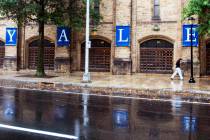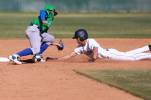Math tests baffle pupils
Higher math failure isn't just a high school phenomenon in the Clark County School District.
End-of-semester exam results show that most district eighth-graders also lack the necessary skills to show competency in algebra.
Districtwide, 79.2 percent of the 14,104 eighth-graders tested in pre-algebra earned grades of F. In Algebra 1, 54.1 percent of 5,976 eighth-graders scored a 59 percent or lower.
Middle schools did score higher pass rates than high schools, with one middle school managing to keep its failure rates below 9 percent.
But for the most part, the middle school results parallel the majority testing failure of district high school students on their end-of-semester exams:
•In Algebra 1, 90.5 percent of students tested flunked.
•In Geometry, 87.8 percent of students failed.
•In Algebra 2, 86.6 percent of students were unable to score a passing grade.
"Results of recent math exams taken by middle and high school students have rightfully raised concerns among all of us -- educators, parents and community -- about the effectiveness of the Clark County School District's math program," Superintendent Walt Rulffes wrote in a letter recently sent home to parents and guardians.
"I want to assure you that the district chose to create and administer the examinations for just that purpose -- to measure the rigor and quality of math instruction across the district."
The exams aren't high-stakes tests and won't draw down punitive measures from federal or state education entities. The purpose of the tests, designed by the district and the Southern Nevada Regional Professional Development Center, is to gauge student proficiency of the required curriculum.
In the wake of the poor results, classroom teachers and school administrators have questioned the fairness of the test. They've also questioned whether the exams are an accurate measure of what students are supposed to learn in the first semester.
Rulffes has called for the formation of a committee of experts to consider that and other issues related to the test and the district math program. Committee membership has not yet been finalized.
Bill Hanlon, who oversees the state-funded Regional Professional Development Center, led the creation of the exams and stands behind them. He believes that the failure rate was inflated by poor test preparation and implementation.
"They were very reasonable questions," Hanlon said. "My belief is that the reason we scored so poorly is that schools didn't take it seriously. I really think that's the issue."
Nothing on the test should have come as a surprise, Hanlon said.
Teachers were invited to help write the test questions. Practice exams were sent out to all the schools.
The content mirrors what district standards require to be taught in the first semester.
"They had this stuff in advance," Hanlon said. "But there were schools that completely ignored it."
That didn't happen at Rogich Middle School, which stands out because most of its eighth-graders earned C's or better on pre-algebra and Algebra 1 exams.
When asked to explain Rogich's success, Principal Suzie Harrison credited her math faculty, who treated the exams as high-stakes testing.
"My honest opinion is that this is not a true representation of other schools," Harrison said. "I truly believe we're doing what other schools are doing."
At Rogich, Harrison said math teachers took full advantage of the practice exams. Students also were asked to write their own practice questions in algebra, as part of the school's emphasis on technical writing. That helped them understand the math vocabulary and also the concepts that might be included on the actual test, Harrison said.
Rogich also allows eighth-graders to give up an elective and enroll in two math classes a year instead of just one. That helps students who may need remediation, and also allows advanced students to hone their skills as well, she said.
"We have honors algebra students who are enrolled in math enrichment," Harrison said.
Rogich also makes a point of going to its feeder elementary schools in the district's Northwest Region to assess fifth-graders' math skills so that they can be placed in appropriate classes at middle school.
School Board member Terri Janison, who represents much of the Northwest Region, applauded Rogich. She said the district as a whole needs to look at what Rogich staff is doing and consider implementing those successful practices more broadly.
"This is a huge indication to me that some schools didn't take it seriously," Janison said. "If these guys did it, other schools can do it, too."
Rogich tested 356 eighth-graders, excluding those enrolled in a basic math course. Other middle schools in urban Clark County areas reported testing fewer than 100 students, another indication that not all teachers participated in mandatory testing, Hanlon said.
Mary Jo Parise-Malloy, whose daughter attends a Southwest Region high school, said she also believes that there were problems with test administration. When she asked her daughter and her daughter's friends about their testing experience, she got a surprising response.
"A number of them were told that these tests didn't count," said Parise-Malloy, a founding member of Nevadans for Quality Education, a public education advocacy group. "And some said they weren't given the tests."
The failure rate is so outrageous that Parise-Malloy said something has to be wrong with the way the tests were given. But as a parent, she's also concerned about the larger questions this raises about the quality of math instruction.
Parise-Malloy said her daughter had one math teacher who allowed students to play cards in class.
She and other parents are also alarmed by the district's use of long-term substitute teachers in higher math classes.
"One substitute affects more than 250 students a day," Parise-Malloy said.
In the Northeast Region, the high failure rate of students on the exams elicited an immediate response from Region Superintendent Marsha Irvin, who held a conference call with principals and instructed them to send out letters to their parents regarding the exams.
Irvin said she doesn't accept that principals in her region were unclear that the exams were mandatory. A book of secondary math expectations for 2007-08 that went out to principals last year clearly stated the district required the exams to be given.
She said her focus is on improving student performance on the second-semester exams.
"One of the things the region is looking at closely is providing more time for administrators to observe instruction," Irvin said.
Irvin also has arranged for the Regional Professional Development Center to offer training sessions in mathematics to teachers. She also wants to increase the involvement of mentor teachers with new math teachers.
The challenges in district classrooms are numerous, Irvin said, ranging from large class sizes to a broad range of student abilities.
"I was concerned that the teachers would blame themselves," Irvin said. "But all of us have to take ownership of the problem. It's an issue the whole community has to be involved with."
Contact reporter Lisa Kim Bach at lbach @reviewjournal.com or 702-383-0287.
Eighth-grade math test scores
Clark County School District eighth-graders performed poorly on end-of-semester algebra and pre-algebra exams. Roughly eight of every 10 students earned failing grades on the pre-algebra test, and roughly one of every two students failed the algebra exam. The middle school results parallel the majority failure of high school students who also were given end-of-semester exams in higher math.
PERCENT OF FAILING STUDENTS
PRE-ALGEBRA ALGEBRA
EAST REGION
Fremont 82.8 83.3
Harney 91.9 70.3
Keller 92.6 86.9
Mack 89.3 72.5
O'Callaghan 80.7 82.8
Orr 77.7 66.7
Robison 96.3 94.4
Woodbury 71.4 41.9
NORTHEAST REGION
Bailey 94.2 60.9
Cram 69.3 19.5
Findlay 87.0 75.3
Hughes 75.3 46.7
Johnston 90.4 89.2
Lyon 83.3 75.0
Monaco 92.2 96.0
Sedway 81.7 40.6
Smith 91.2 85.7
Swainston 78.0 0
Von Tobel 99.7 98.9
SUPERINTENDENT SCHOOLS
Bridger * 57.0
Cashman 92.5 85.6
Gibson 84.6 96.5
Hyde Park 87.8 24.3
Knudson 75.2 52.7
Martin 100.0 80.9
NORTHWEST REGION
Becker 65.1 36.1
Brinley 93.3 85.4
Cadwallader 56.9 19.0
Escobedo 83.9 61.5
Indian Springs 93.3 100.0
Leavitt 52.0 54.6
Lied 78.1 39.4
Molasky 64.5 10.3
Rogich 8.4 8.5
Saville 56.7 24.6
SOUTHEAST REGION
Brown 89.1 51.9
Burkholder 85.3 68.3
Cannon 92.7 93.3
Cortney 90.3 78.6
Garrett 81.6 65.4
Greenspun 52.2 22.9
Laughlin 87.5 97.9
Mannion 71.3 11.0
Miller 55.7 27.6
Schofield 84.1 40.2
Silvestri 88.8 37.1
Webb 95.6 77.7
White 73.1 45.5
SOUTHWEST REGION
Canarelli 78.9 35.1
Faiss 70.7 32.5
Fertitta 84.5 52.7
Garside 91.9 77.1
Guinn 61.1 49.5
Johnson 90.4 89.2
Lawrence 63.5 18.5
Sawyer 72.7 35.5
Sandy Valley 100 72.7
Tarkanian 90.6 80.6
EDUCATION SERVICES SCHOOLS
West Prep 96.5 94.0
SCHOOL DISTRICT AVERAGE
79.2 54.1
*No students tested
SOURCE: Clark County School District




























